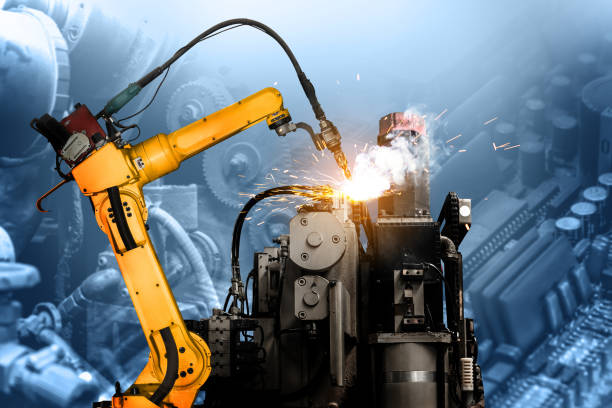I. Introduction: The Rise of Robotic Welding
Robotic welding has revolutionized the manufacturing industry, offering unparalleled precision, efficiency, and consistency in welding processes. From automotive to aerospace, robotic welding systems are increasingly being adopted to meet the demands of high-volume production and complex welding tasks. However, like any advanced technology, robotic welding is not immune to defects and faults.

In this article, we will explore the most common defects and faults encountered in robotic welding, their underlying causes, and practical solutions to overcome them. Whether you're a seasoned engineer or a manufacturer looking to optimize your welding operations, this guide will provide valuable insights to help you achieve flawless welds and maximize productivity.
II. Common Defects in Robotic Welding
1. Incomplete Penetration
-
Cause: Insufficient heat input, incorrect welding parameters, or improper joint design.
-
Solution: Adjust the welding current, voltage, and travel speed. Ensure proper fit-up and joint alignment. Use advanced welding machines with precise parameter control, such as those offered by MEGMEET Welding Technology.
2. Surface Porosity
-
Cause: Contamination of the base metal, inadequate shielding gas flow, or high levels of moisture.
-
Solution: Clean the base metal thoroughly before welding. Use high-quality shielding gas and ensure proper gas flow rates. Maintain a clean and dry welding environment.
3. Lack of Fusion
-
Cause: Incorrect weld parameters, poor joint preparation, or misalignment of the weld gun.
-
Solution: Verify and optimize welding parameters for the specific material and thickness. Ensure proper joint preparation and alignment of the weld gun. Use advanced weld monitoring systems for real-time feedback.
4. Weld Spatter
-
Cause: High welding current, incorrect polarity settings, or improper shielding gas composition.
-
Solution: Adjust the welding current and voltage to suit the material. Use the correct polarity and shielding gas mixture. Regularly maintain the weld gun and replace worn-out nozzles.
5. Crater Formation
-
Cause: Sudden stoppage of the welding arc without properly filling the crater.
-
Solution: Use welding machines with built-in crater filling capabilities, such as those equipped with MEGMEET’s advanced start/stop control systems. Gradually reduce the current at the end of the weld to fill the crater.
6. Weld Bead Profile Irregularities
-
Cause: Incorrect weld travel speed, uneven heat input, or poor weld gun positioning.
-
Solution: Adjust the travel speed and heat input parameters. Use robotic systems with precise positional control. Regularly calibrate the weld gun and ensure proper alignment.
7. Arc Blow
-
Cause: Magnetic fields interfering with the welding arc, often due to uneven workpiece conductivity or improper grounding.
-
Solution: Improve workpiece grounding and ensure proper electrical connections. Use anti-stick welding consumables and adjust the arc characteristics to minimize interference.
III. Common Faults in Robotic Welding Systems
1. Robot Programming Errors
-
Cause: Incorrect or outdated programming, leading to misalignment or improper weld paths.
-
Solution: Regularly update and verify welding programs. Use simulation software to test programs before production. Train operators in advanced robotic programming techniques.
2. Weld Gun Wear and Tear
-
Cause: Prolonged use without maintenance, leading to worn-out nozzles, contact tips, or liners.
-
Solution: Implement a regular maintenance schedule for the weld gun and its components. Replace worn-out parts promptly to maintain weld quality.
3. Shielding Gas Flow Issues
-
Cause: Blockages in the gas delivery system or incorrect flow settings.
-
Solution: Clean and inspect the gas lines regularly. Ensure the correct shielding gas flow rate is used for the specific welding process and material.
4. Power Source Fluctuations
-
Cause: Voltage fluctuations or unstable power supply affecting weld quality.
-
Solution: Use high-quality power sources with stable output, such as MEGMEET’s advanced welding machines. Install voltage stabilizers or uninterruptible power supplies (UPS) to maintain consistent power.
5. Sensors and Vision System Malfunctions
-
Cause: Faulty sensors or vision systems leading to misalignment or improper weld detection.
-
Solution: Regularly calibrate and maintain the sensors and vision systems. Use high-quality components and ensure proper integration with the robotic welding system.
IV. How to Troubleshoot Robotic Welding Issues
1. Conduct Regular Maintenance
Perform daily, weekly, and monthly maintenance checks on the robotic welding system, including the weld gun, shielding gas system, and power source.
2. Monitor Weld Parameters
Use real-time monitoring systems to track welding parameters such as current, voltage, travel speed, and gas flow. Adjust as necessary to maintain consistent weld quality.
3. Train Operators
Ensure that operators are well-trained in robotic welding operations, programming, and troubleshooting. Regular training sessions can help prevent errors and improve efficiency.
4. Use High-Quality Equipment
Invest in advanced welding machines and robotic systems from reputable manufacturers like MEGMEET Welding Technology. High-quality equipment ensures consistent performance and minimizes defects.
5. Implement Quality Control Measures
Establish a quality control process to inspect welds regularly. Use non-destructive testing (NDT) methods to detect and address defects early.
V. MEGMEET Welding Technology: Your Partner in Robotic Welding Excellence
At MEGMEET Welding Technology, we specialize in designing and manufacturing advanced welding machines and robotic welding solutions. Our equipment is engineered to address common defects and faults in robotic welding, ensuring high-quality welds and optimal productivity.
With features such as:
-
Precise parameter control for consistent weld quality.
-
Advanced start/stop control systems to prevent crater formation.
-
Stable power output for reliable performance.
-
User-friendly interfaces for easy programming and operation.
MEGMEET welding machines are the perfect choice for manufacturers looking to enhance their robotic welding operations.
Conclusion: Achieve Flawless Welds with MEGMEET
Robotic welding offers immense potential for improving efficiency and weld quality, but its success depends on addressing common defects and faults effectively. By understanding the root causes of these issues and implementing the right solutions, manufacturers can unlock the full potential of robotic welding.
With MEGMEET Welding Technology by your side, you can overcome challenges and achieve flawless welds consistently. Visit our website today to explore our range of advanced welding solutions and take your robotic welding operations to the next level.
Related articles:
1. Robots & Cobots Revolutionizing Welding Automation
2. Best 5 Arc Welding Robot Brands in the World (2024)
3. Collaborative Robotic Welding: Enhanced Precision and Efficiency
4. Megmeet 1,500 Robot Welding Power Sources Signing Ceremony!
5. How to Choose the Correct Welding Torch for Robotic Welding?




